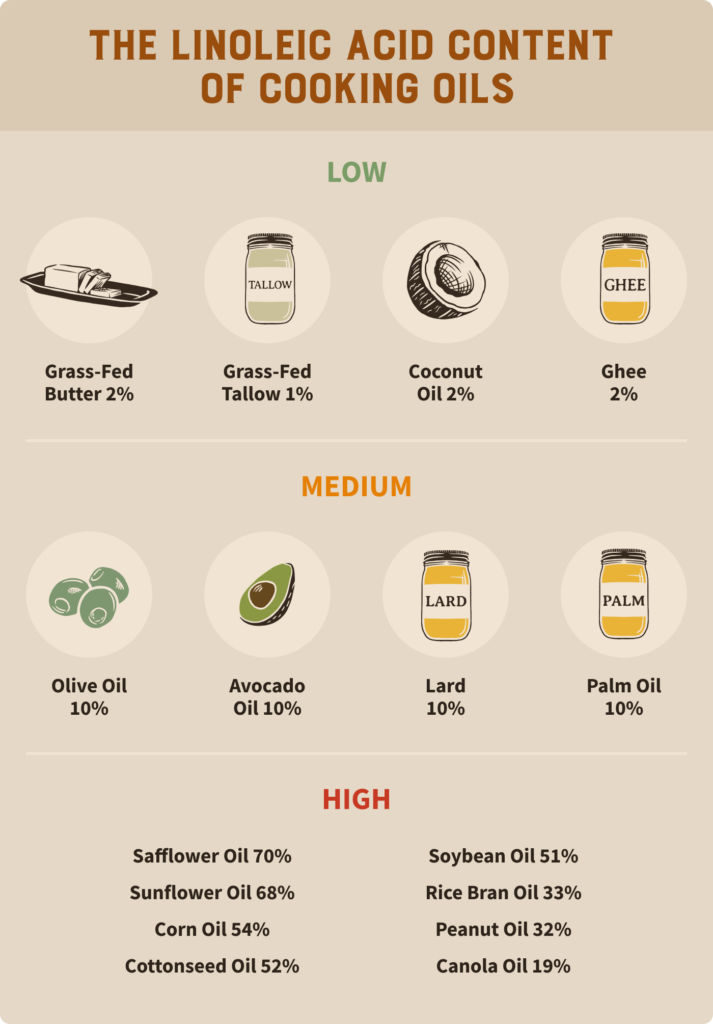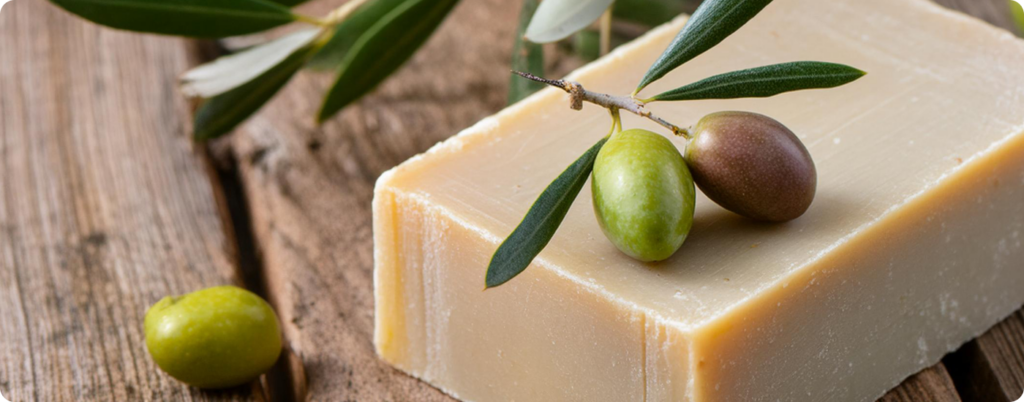PLEASE NOTE: The information in this blog is for educational purposes only. It is not a substitute for professional medical advice. Consult your healthcare provider if you’re seeking medical advice, diagnosis, or treatment.
Few topics in the health world are as controversial and divided as seed oils. Some claim they should be avoided at all costs, while some claim they are a “heart-healthy” alternative to traditional fat sources like butter, tallow, or coconut oil.
One of the most popular oils that gets caught in the crossfire is olive oil. Considered an “elixir of youth and health” by the Ancient Greeks, we’ll find out why this oil has so many potential benefits, yet people are wary of it.

You will also discover:
- Is olive oil a seed oil or a vegetable oil?
- Why has olive oil been used for thousands of years
- 7+ potential benefits of olive oil
- How to find the highest quality olive oil
Is Olive Oil a Seed Oil?
So, is olive oil a seed oil? The short answer is no, it’s considered a vegetable oil that’s created from the fruit of an olive tree.
Let’s unpack this more…
Seed oils are derived from the seeds of crops, and they’re used in most packaged and ultra processed food, restaurants, infant formulas, and salad dressings.
Common seed oils (also called vegetable oils) include rapeseed oil, soybean oil, sunflower oil, grapeseed oil, cottonseed oil, and safflower oil. All seed oils can be considered vegetable oils, but not all vegetable oils are seed oils.
Seed oils contain high levels of linoleic acid, an essential omega-6 polyunsaturated fatty acid (PUFA). Linoleic acid is not inherently bad, but the excessive amounts consumed today may contribute to numerous issues. Fried foods and ultra-processed foods are also commonly prepared with these oils.

Why It Matters
You may be asking yourself, who cares if olive oil is a seed oil or not? However, the fact that it’s not a seed oil makes it a more appealing option than more popular options like canola oil or soybean oil.
First, olive oil has a more favorable breakdown of fats compared to seed oils. It’s noted for its balance of monounsaturated, polyunsaturated, and saturated fat (1). It’s particularly high in monounsaturated fatty acids (specifically oleic acid) and of all vegetable oils has the highest ratio of monounsaturated to polyunsaturated fatty acids (2).

Excessive intake of omega-6 PUFAs found in seed oils may promote the development of cardiovascular disease, autoimmune diseases, and cancer (3, 4). Meanwhile, monounsaturated fat is thought to promote the immune system, heart health, and more (5, 6).
Another concern for seed oils due to their high PUFA content is that they can easily oxidize and may promote disease (7). Frying these oils can also lead to the production of free radicals, potentially leading to inflammation (8).
The processing of olive oil is also different than seed oils. Although it commonly gets grouped with seed oils, the processing for olive oil is far less intense which can preserve its beneficial properties (9). Seed oils require chemical extraction and chemical solvents, but olive oil is essentially just fruit juice (10). It also has a neutral flavor and can be versatile as a cooking oil.
Olive oil also has a variety of potential benefits that set it apart from the pack (even from other plant oils like avocado oil).
Olive Oil Benefits For Your Heart, Gut, and Beyond
Olive oil has been treasured for thousands of years across various cultures.

The Ancient Greeks believed that it held medicinal properties and used it for digestive issues, skin conditions, and other health challenges (11). You can also find mention of it in the bible, quran, and from the Ancient Egyptians.
In recent times, olive oil has been closely studied and is often viewed as a key contributor to the success of the widely popular Mediterranean diet (12). Olive oil consumption may potentially improve the following areas:
1. Chronic Disease Outcomes
Olive oil has been closely investigated for potential benefits for cardiovascular health, along with cancer and diabetes outcomes (13, 14, 15). Today, over 60% of global deaths are estimated to be from chronic illnesses that are frequently preventable (16)
A large portion of these deaths are from cardiovascular diseases, which are largely preventable (17). Olive oil consumption has shown connections to reduced risk of cardiovascular disease, improved blood pressure, and improved endothelial function (18, 19, 20, 21).
Similar to cardiovascular disease, around 40% of cancer cases may be preventable through physical activity and a proper diet (22).
Olive oil has also shown promise against multiple forms of cancer, such as breast, colon, and leukemia (23, 24, 25). One meta-analysis of 45 studies even found a 31% lower risk of cancer for those with the highest olive oil consumption (26).
2. Obesity
Over 33% of adults around the globe are now considered overweight or obese (27). Obesity can then contribute to major health challenges such as diabetes and cardiovascular disease.
Olive oil as part of a healthy diet is viewed as a potential strategy to prevent obesity and may help reduce body fat (28, 29, 30).
3. Nutrient Density
Olive oil also offers vitamin E, polyphenols, and other compounds that may have anticancer, antioxidant, antimicrobial, and anti-inflammatory effects (31, 32).
4. Skincare
Olive oil has been used for centuries as a tool for skincare (33). A medical text from around 1,550 BCE, The Ebers Papyrus, even contained recipes to be used for eczema and psoriasis (34).

One study found that a mixture of olive oil, honey, and beeswax led to improvements in eczema symptoms (35).
5. Bone Health
Olive oil may also protect bone health, increase bone mineral density, and help reduce bone loss (36, 37).
6. Gut Health
Olive oil is also being explored as an ally for gut health. Some studies have shown that olive oil can modulate the composition of gut microbiota and reduce gut permeability (38, 39).
Acting as a prebiotic and antibacterial, olive oil can stimulate the growth of beneficial bacteria while reducing pathogenic bacteria (40).
7. Brain Health
Last but not least, olive oil is also beneficial for brain health (41). In particular, it’s been shown to reduce cognitive decline, enhance blood-brain barrier function, and improve cognitive function (42, 43).

Affecting about 50 million people, extra virgin olive oil may also help protect against alzheimers disease (44, 45).
Watch Out For Fraud in The Olive Oil Industry
Unfortunately, grabbing any bottle of olive oil from your local supermarket may not cut it. In an effort to maximize profits, olive oil products fall victim to numerous fraudulent practices that can destroy its beneficial compounds and potentially contribute to health issues.

Olive oil commonly falls victim to three main issues (46, 47):
- Mixing with cheaper, lower-quality oils
- Misleading labeling concerning quality and origin
- Price fraud
Seed oils like soybean, canola, corn, or peanut oil have all been detected in olive oil products. These fraudulent activities can remove the beneficial properties of olive oil, lead to easier oxidation, and may result in the consumption of carcinogenic or allergenic substances (48).
What to Look For When Buying Olive Oil
The term “olive oil” is regularly used for any oil coming from olives, but they’re actually classified based on quality, acidity, and other characteristics (49).
The two most notable options are extra virgin olive oil (considered the highest quality and best tasting) and refined olive oil (50). EVOO processing preserves the nutritional value of the olives, whereas refined oils lose many of the beneficial components and result in an inferior product (51, 52, 53).

EVOO provides the highest amount of polyphenols and over 200 minor compounds, but refined olive oil has lower amounts (54, 55, 56). Here are some tips for finding the highest quality olive oil:
- Look for extra virgin olive oil
- Organic brands may lead to less pesticide exposure
- Dark glass bottles can protect the oil from light
- Look for smaller bottles, as olive oil can go rancid
- Look for brands that offer transparency about the ingredients and origins of the oil
A Better Alternative to Seed Oils
Is Olive Oil a Seed Oil? No, although it’s often mentioned alongside them, it can be a far better option with potential benefits for your skin, gut, brain, and beyond. Its less intensive processing, stability, rich history, and fat composition also make it a more appealing selection.
Subscribe to future articles like this: